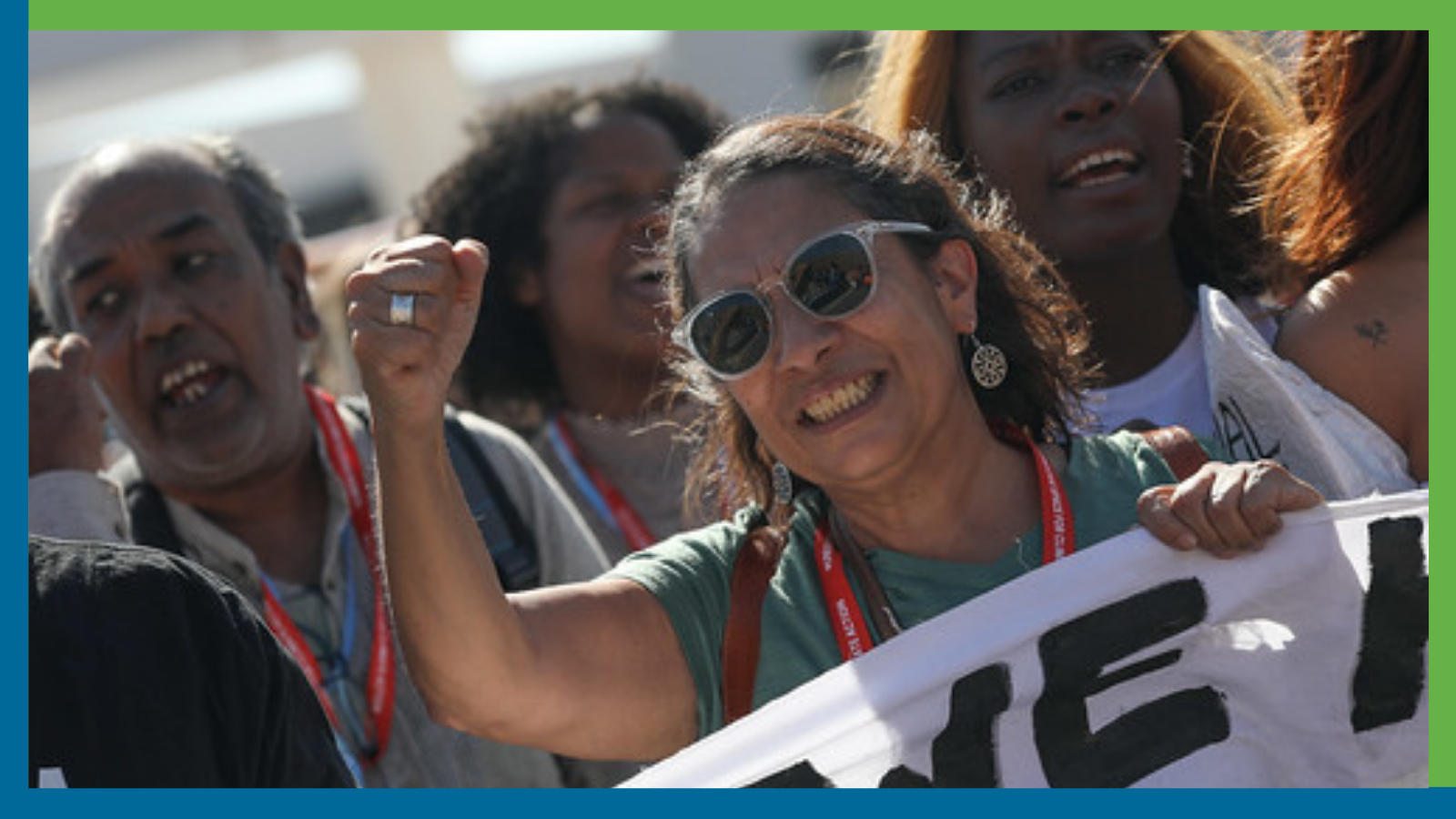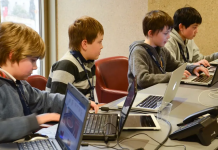In honor of International Women’s Month, The Planetary Press is highlighting women around the globe who are driving positive change for our planet and global community. Today, we are thrilled to introduce you to climate justice activist and Executive Director of Climate Action Network International, Tasneem Essop.
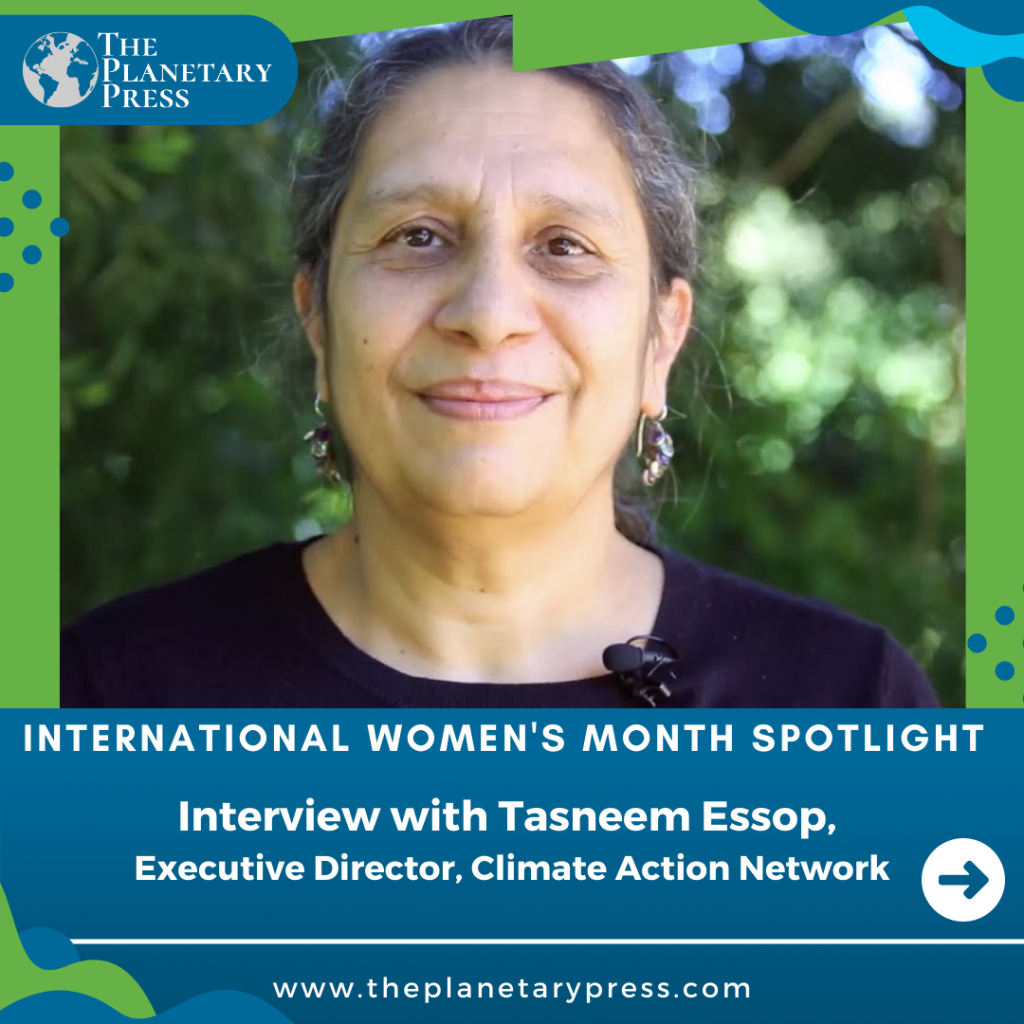
You have a remarkable career, from anti-apartheid activist to trade unionist to serving as the Provincial Minister for Environment, Planning, and Economic Development to leading global climate policy and strategy for WWF International. Can you share some highlights of your incredible journey and what inspired you to get involved with the climate movement?
My life’s path has been driven by my early days of living through and fighting against an apartheid system in South Africa. A system that was declared a crime against humanity by the UN, a system that separated people based on color, a system that actively and repressively promoted white supremacy. Facing these injustices started early in my life when my family was forcibly removed from District Six, in one of the biggest Apartheid forced removals and displacement in the country. As a 13-year-old, watching your family home get bulldozed and being separated from the community you grew up in, and the heartbreak that came with that forever left its mark on my life.
This was the point that I dedicated my life to fighting injustice wherever it arises, and this commitment has been the driver in all the roles I played in my “career,” whether this was in the role of teacher, trade unionist, legislator, or Minister. I have always been an activist for equity and justice. So, it was inevitable that I ended up in the climate movement fighting a crisis caused and driven by a fundamentally unjust system that leads to the clearest injustice of all, namely that those least responsible for the climate crisis are having to bear its fiercest impacts. These are the same sections of our society facing other social, racial, and political injustices. This is why our fight against the climate crisis and for climate justice must be intersectional in nature and practice.
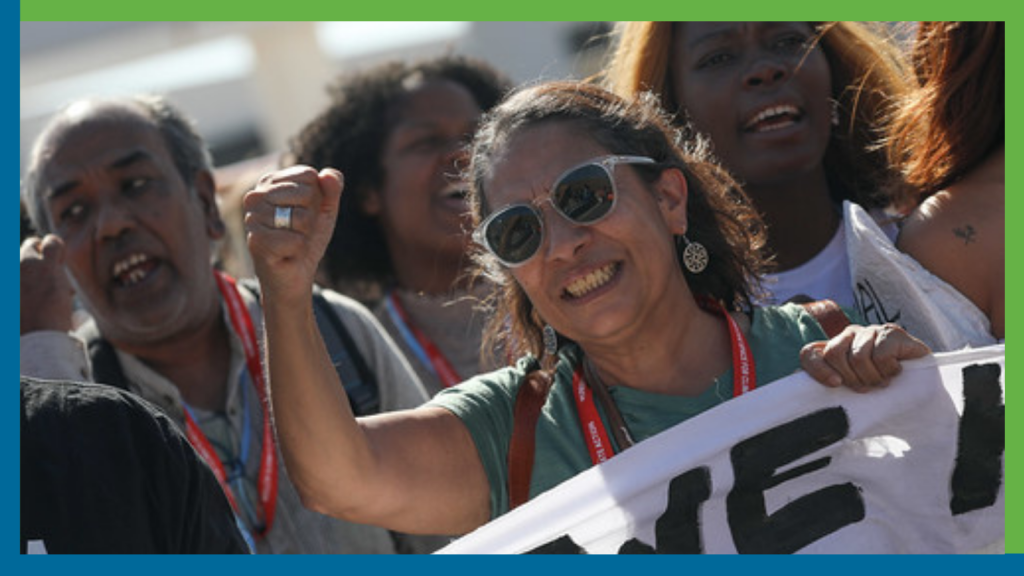
You are the Executive Director of Climate Action Network International. Can you tell us about the work you do there and your mission?
CAN International is one of the largest global networks of civil society organizations working to address the climate crisis. We are present in over 130 countries in the world, with about 2000 members globally. In recent years we have recognized the need to be intersectional in our work, and therefore our mission is to achieve climate justice that also fundamentally includes addressing social and racial injustices.
As the Executive Director, I play a role in leading and guiding the Network in its strategic direction, which includes building a bottom-up driven network, strengthening our nodes in the Global South, and building cohesion in the network in its overall ambition to support building the power of movements and to use this power strategically and tactically to achieve our objectives. I also play an active role in building relationships and collaboration with our allies and partners in the wider movement. I represent CAN-International in our engagements within key international bodies— for example, the UNFCCC— and lead our engagements with COP Presidencies and other government leaders in relevant fora.
As head of the CAN International Secretariat, we are also responsible for the coordination, collaboration, and convening of the Network as well as supporting the delivery of the Network’s five-year strategy and annual program of action. Together with my Executive team, we are responsible for the management of the Secretariat team, ensuring their well-being and creating a fair and inclusive work environment. I also lead our fundraising work. I am accountable for the delivery of all this work by the CAN International Board and the Network through its Annual General Assembly.
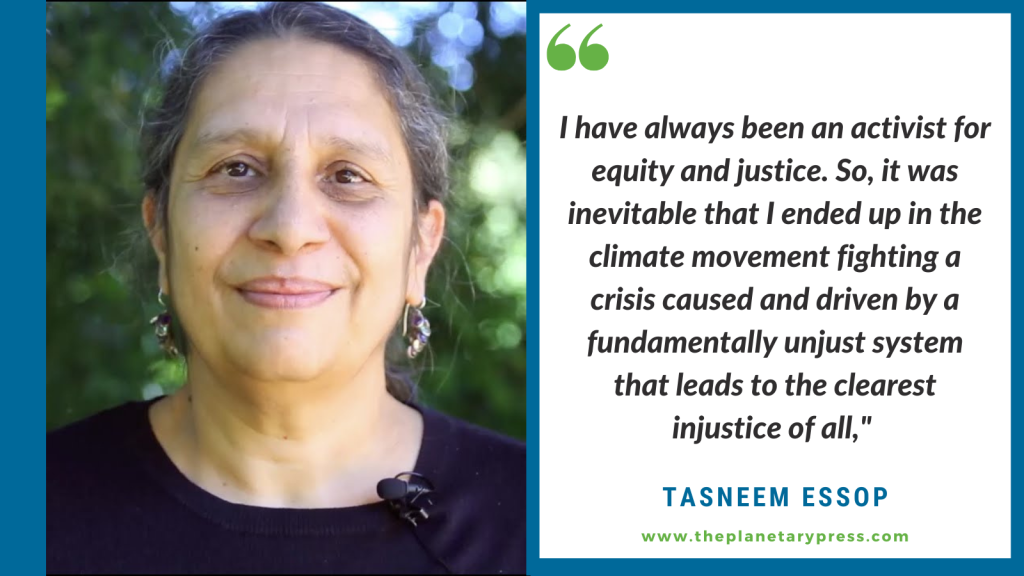
You were the Founding Director of the Energy Democracy Initiative, which aimed to support and empower communities to take control of their energy future. Can you elaborate on the concept of energy democracy and what led you to start the initiative?
After leaving WWF International and my work in the global space, one of the big challenges I felt needed to be addressed was how to combine climate solutions with social and developmental objectives at a grassroots level. In other words, how can we ensure that marginalized, poor working-class communities would benefit from the rollout of solutions in a way that ensures equity and justice. And to do this in a manner that is truly led and owned by the communities themselves, building off their agency and knowledge, supporting their capacity needs, and resulting in developmental progress.
I thought that the option of community-based and owned renewable energy would meet these multiple objectives: reducing reliance on coal-based electricity, addressing energy poverty as well as providing economic ownership through owning the means of energy production and not merely being an energy consumer. Renewable energy technology provides one of the best opportunities to be democratic because it can be decentralized, and with support and capacity, it can allow for different models of ownership and management. In this Energy Democracy Initiative, we wanted the process, the ownership, and the outcome to be democratic, inclusive, and participatory.
We launched the initiative in four poor working-class communities after engagement and consultation, two urban and two peri-urban. After a series of amazing capacity-building and working sessions, the initiative, unfortunately, did not continue due to my own departure to CAN International as well as the COVID crisis. I am deeply saddened by this because it could have been an amazing best practice model for how we can take a truly community-led and democratic approach to deliver renewable energy and not depend only on large private sector renewable energy projects.
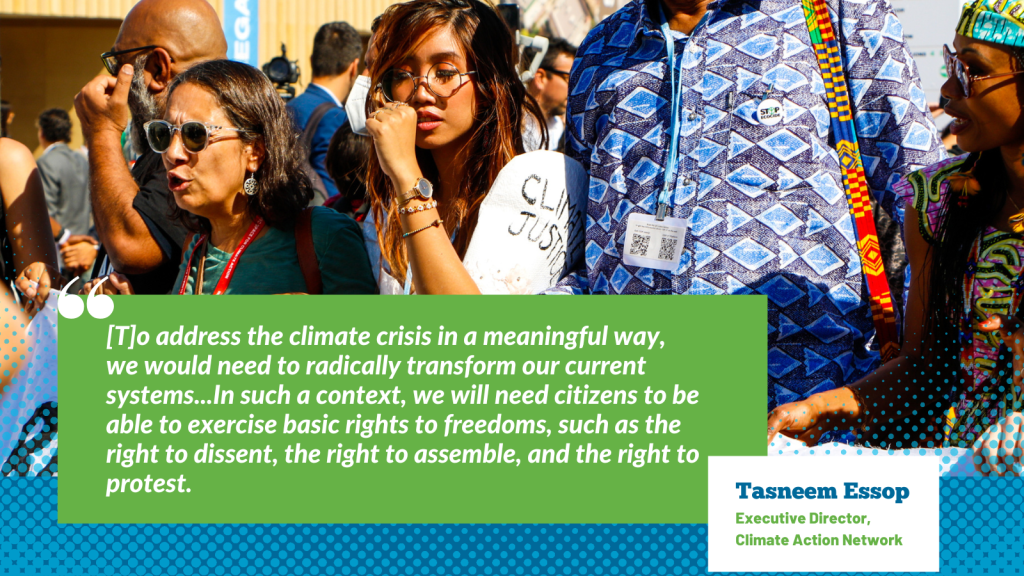
You have said that there can be no climate justice without human rights. Can you discuss how these are intrinsically linked and how civil society can help to drive policy change and hold leaders accountable?
The link between the climate crisis and human rights materializes in several ways. Firstly, through the impacts of the climate crisis itself, where we witness challenges to basic rights such as the right to life, to livelihoods, to safety and security, the right to cultural protection, the right to health and other basic services, etc.
Secondly, human rights can also be impacted when addressing and implementing the solutions for the crisis. Examples of these could include the right to democratic and inclusive governance and decision-making, the right to express freedom of expression and opinion, the right to work, and the right to a safe environment. The right to Free, Prior, and Informed Consent for Indigenous peoples is yet another example. These rights cannot be trampled on in our quest to find solutions for the climate crisis, whether these are technological or through the transformation of systems and economies.
Finally, we know that to address the climate crisis in a meaningful way, we would need to radically transform our current systems. In its recent Assessment Report, the IPCC confirms the need to disrupt our existing systems. In such a context, we will need citizens to be able to exercise basic rights to freedoms, such as the right to dissent, the right to assemble, and the right to protest.
The links between climate justice and human rights are, therefore, very clear. It is important for people to first understand what rights they have, and as a start, they should familiarize themselves with the UN Declaration of Rights. Arming themselves with this knowledge, they should build awareness with others and build a strong base of people who will be willing to stand up to protect these rights. This would also mean being very vigilant about the decisions and actions that governments are taking.
Historically, the Global North has fueled environmental harms and human rights issues in the Global South, causing widespread environmental degradation, rapidly warming temperatures, and supporting industries tied to egregious human rights abuses such as trafficking and modern slavery. Loss and damage was a key topic at COP27 climate negotiations in Sharm El Sheikh. Can you share your thoughts on the Loss and Damage Fund announced at COP27 and how this fund can support those unjustly on the frontlines of the climate crisis?
Losses and damage due to the impacts of climate change is one of the key issues that demonstrates the injustices of the climate crisis. The burdens of these impacts are most sharply felt in the Global South and has devastating impacts, mainly on people and communities who are already vulnerable and marginalized— those living in poverty, suffering inequities, or experiencing discrimination, such as Indigenous peoples, women, people of color, and those living with disabilities. These are people living on the frontline of multiple crises. The roots of these vulnerabilities can be traced to the colonial past.
Tackling the issue of financing for loss and damage is, therefore, key to ensuring climate justice. However, Global North countries were not willing to reach agreements on this for over 30 years. CAN and other civil society allies made this a key litmus test for COP26 in Glasgow so that it can be an issue that can no longer be ignored. While we did not achieve an outcome in Glasgow, we continued our pressure leading up to and at COP27 in Sharm El Sheikh, using a range of tactics.
Our efforts resulted in a victory, a first critical step towards achieving justice— an agreement by governments to establish a Loss and Damage Fund. Now the real work begins to ensure that the fund is operational and that funds are mobilized. The historical polluters in the Global North, and in particular their fossil fuel industry, must take the lead in mobilizing these resources as part of their responsibility to compensate for causing the climate crisis and other connected harms.
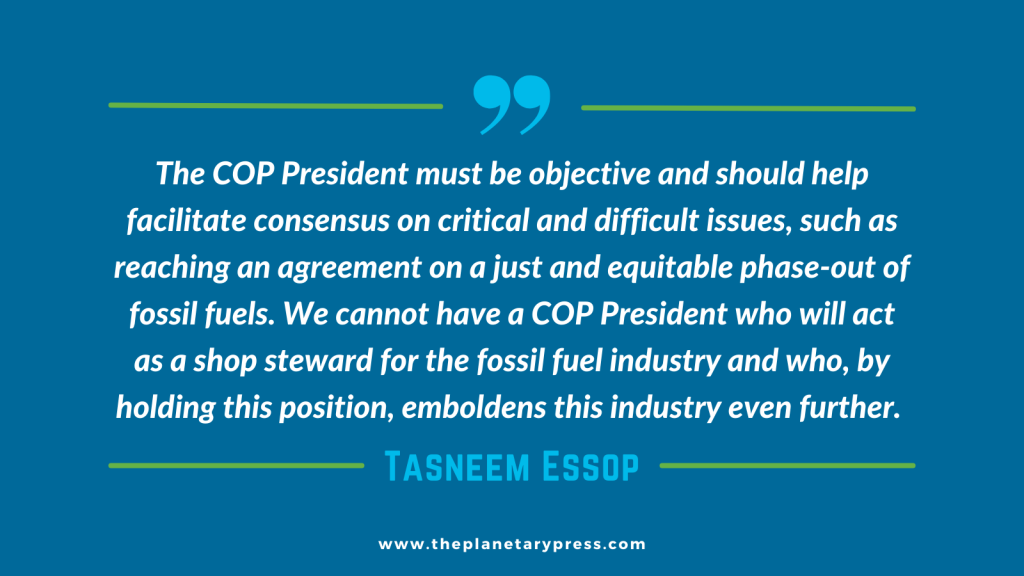
COP28 is facing criticism from environmental activists and civil society groups from across the globe for installing a petrostate national oil company leader as the head of the global climate conference. Can you share your thoughts on this and what message you have for world leaders who are missing the mark on effectively addressing the climate emergency?
The fossil fuel industry has long been an influence in the UNFCCC process; through their influence on government positions at the national level, being part of government delegations, their industry chambers, and physical presence at these meetings, they are the hidden hand that has succeeded in keeping the issue of phasing out fossil fuels, the main driver of the climate crisis, off the agenda. Their influence is becoming more visible in recent times as the pressure mounts for the COP to reach an agreement on this phase-out. The increased visible presence of fossil fuel lobbyists in Glasgow, with over 700 delegates and continuing with increasing numbers in Sharm El Sheikh, has set the precedent for COP28. We are expecting a very large presence in Dubai.
We are dealing with a desperate industry that knows its time is up but remains emboldened by the decisions of governments, especially in the Global North, to continue to invest in fossil fuels and expand production. The pressure of the war in Ukraine has resulted in another colonial extractivist dash for fossil resources in the Global South, such as the dash for gas in Africa. Within this context, having a COP President who is, at the same time, the CEO of ADNOC, a national oil company in the United Arab Emirates, presents a clear conflict of interest.
The COP President must be objective and should help facilitate consensus on critical and difficult issues, such as reaching an agreement on a just and equitable phase-out of fossil fuels. We cannot have a COP President who will act as a shop steward for the fossil fuel industry and who, by holding this position, emboldens this industry even further. This is why CAN and other civil society organizations have called for his resignation as CEO of ADNOC. We need a visible firewall between these roles. Together with other constituencies, we have also called on the UNFCCC to agree to a Conflict-of-Interest policy that should be implemented as soon as possible.
How can people become involved with and support the critical work of Climate Action Network International?
We would love people to get involved with CAN, either through joining our network if you are a member of an organization or through supporting our campaigns and work. We have CAN regional and national nodes across the world that you can join or support. You can also support CAN International if you are an organization that operates globally. I encourage people to look at our website to see the work we are doing and look at ways of supporting this. This year we will be joining hands with the wider climate movement to escalate our fights against the fossil fuel industry. It would be great if people could join us, support our efforts, follow us on social media, and amplify our stories. What matters, though, whether you do this through supporting CAN or not, please just use your power, individually or collectively, to take actions that will address the crisis and help us build a better world for all.
What advice would you have for your 13-year-old self?
Remain grounded and humble. Be principled and act with integrity. Be guided by a strong set of values such as love for humanity, respect, and honesty. Always stand with those who are experiencing injustice, being discriminated against, and oppressed. Act with courage. Serve. And most of all, be joyous, have fun and spread happiness.
Keep up with Tasneem and Climate Action Network!
Website: www.climatenetwork.org
Twitter: @CANIntl and @TasneemEssop
Facebook: @CANInternational
Instagram: @CAN.International
Subscribe to the ECO newsletter that is produced during UNFCCC
Sessions: https://climatenetwork.org/resource_type/eco-newsletter/

